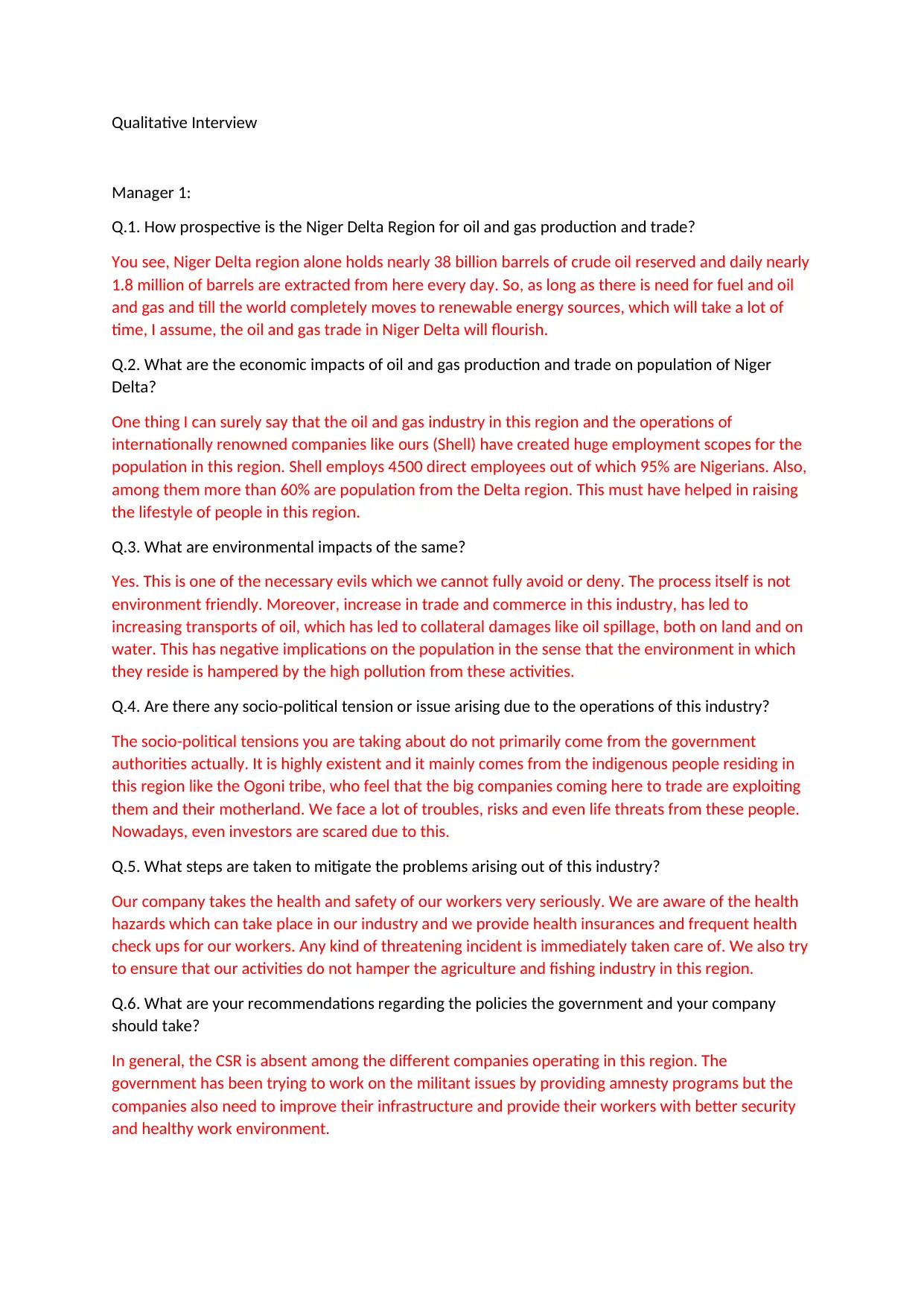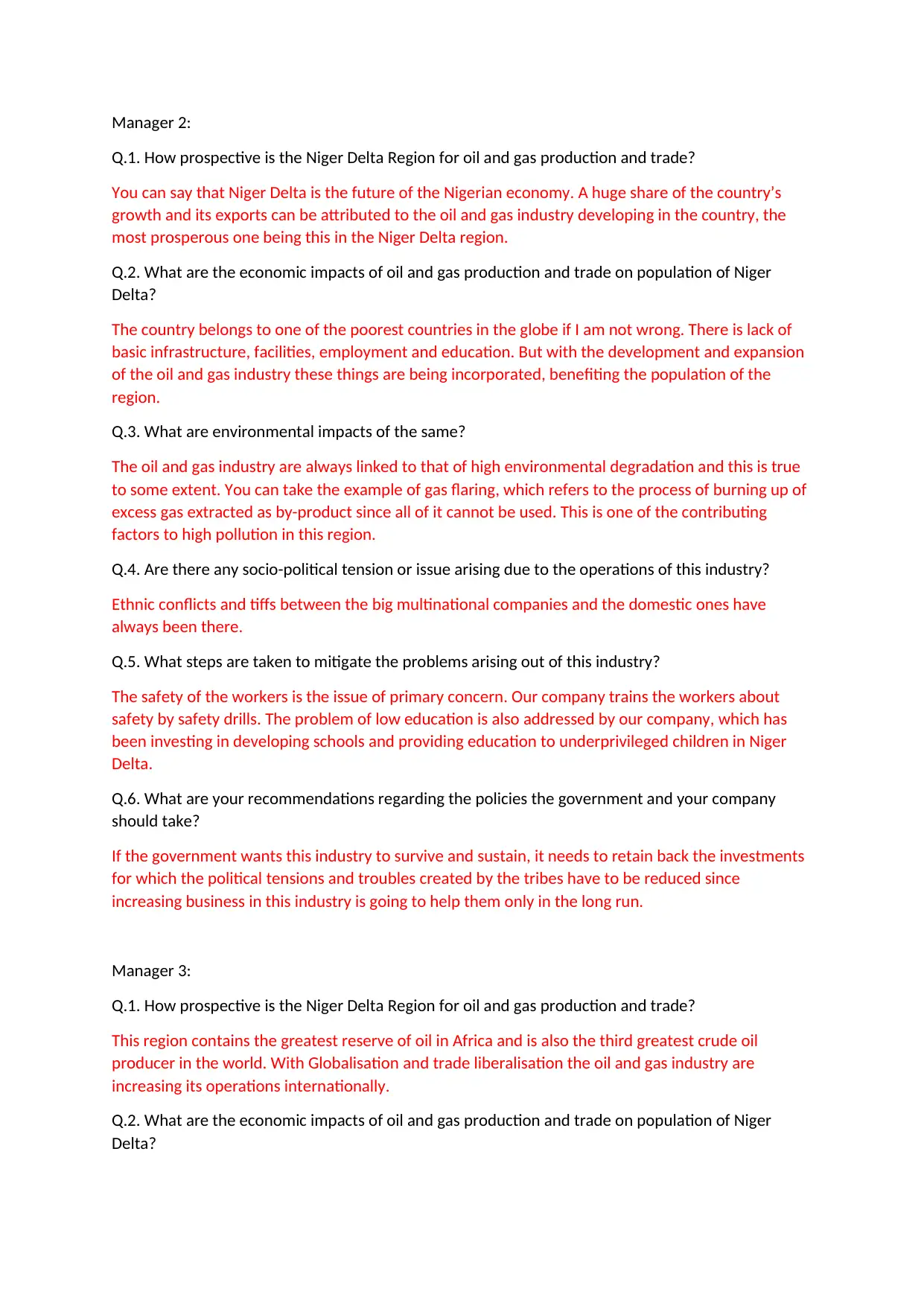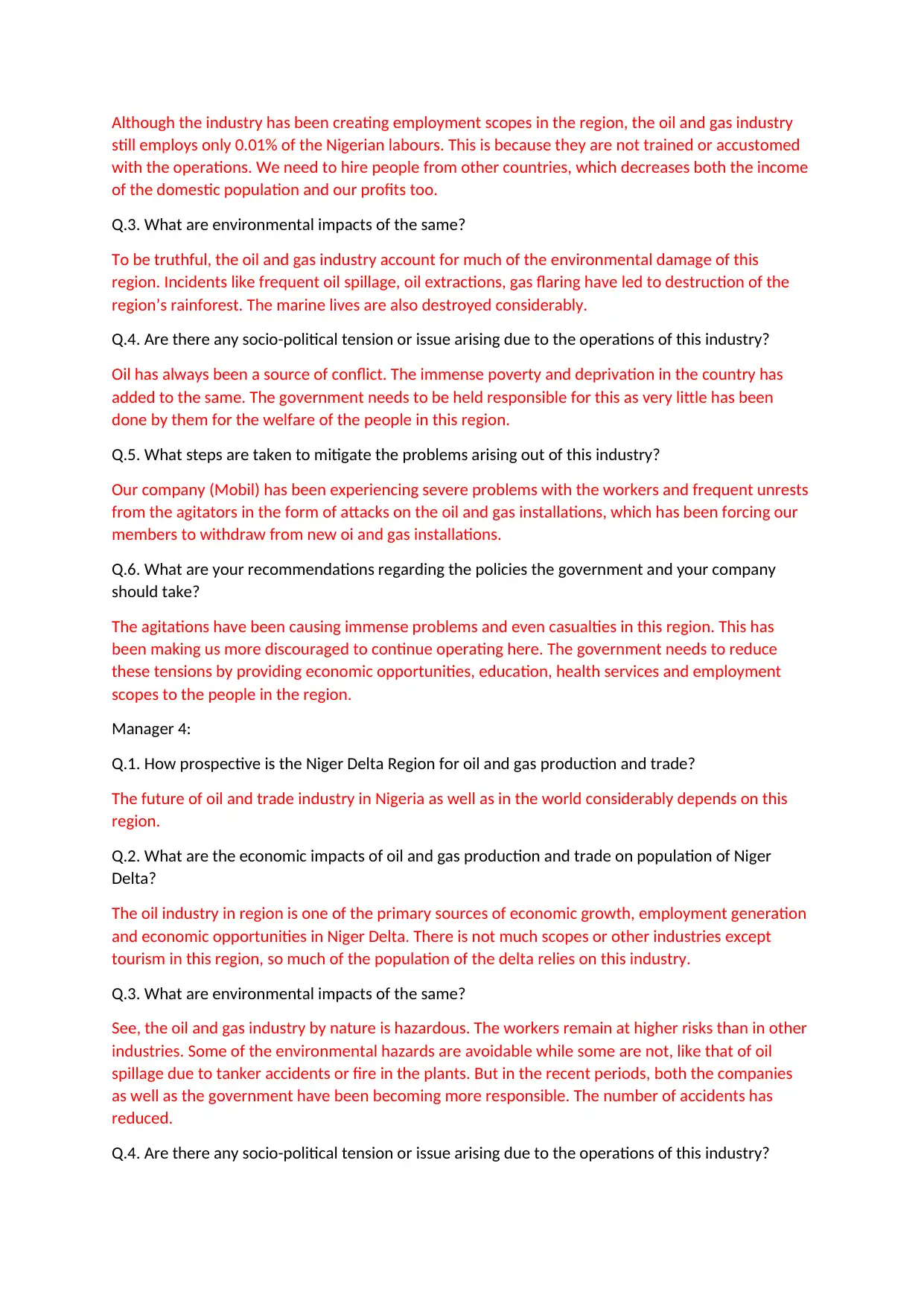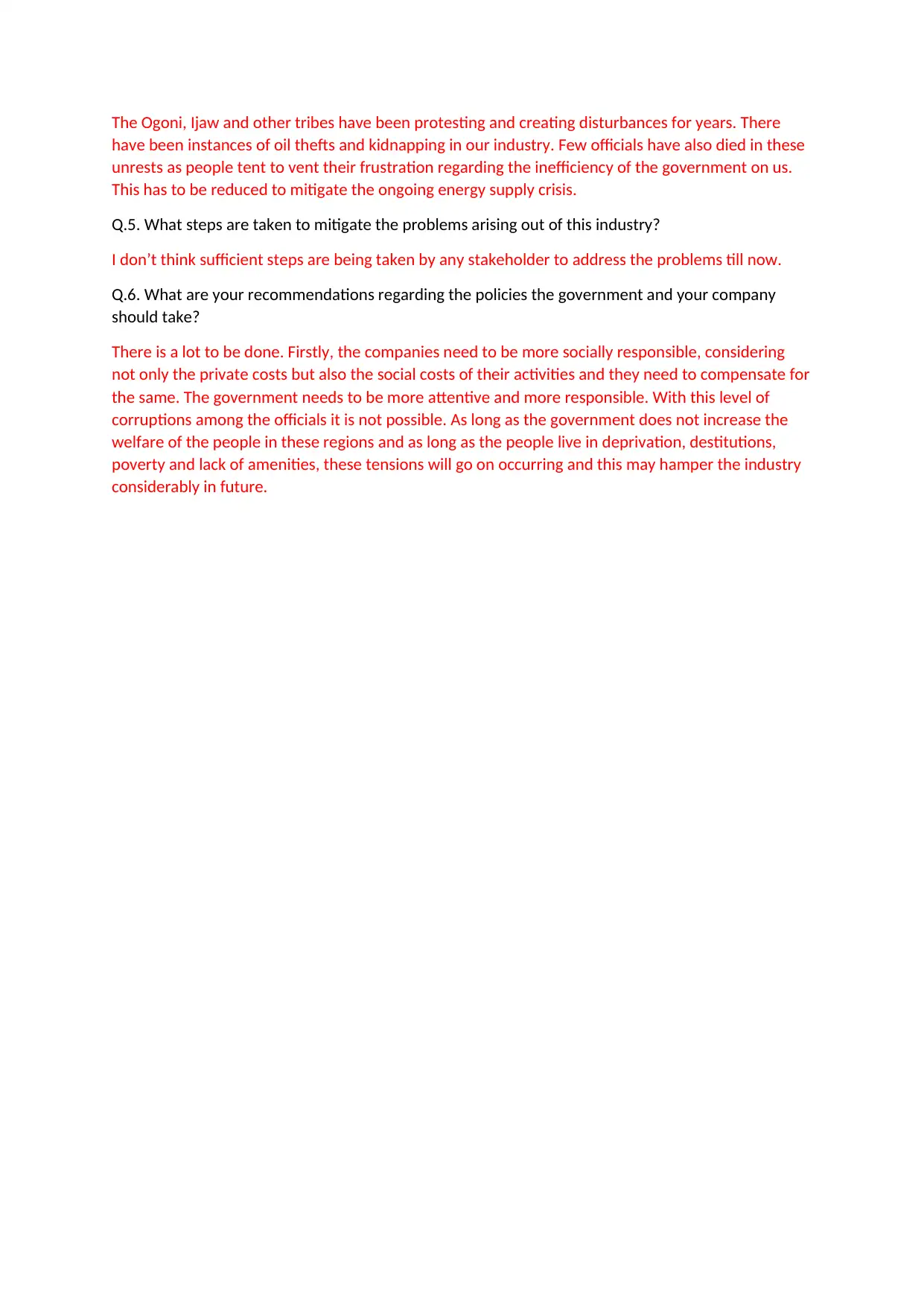Research Report: Impact of Oil and Gas in Niger Delta Region
VerifiedAdded on 2023/06/10
|4
|1805
|462
Report
AI Summary
This report presents an analysis of the oil and gas industry's impact on the Niger Delta region, drawing on interviews with industry managers. The report investigates the economic benefits, environmental consequences (such as oil spills and gas flaring), and socio-political tensions arising from oil production. It explores employment opportunities, infrastructure development, and the challenges faced by local communities, including conflicts with multinational companies and indigenous populations. The report also examines the steps taken to mitigate problems, such as health and safety measures, and offers recommendations for government and corporate policies to promote sustainable development, reduce environmental damage, and address social inequalities. It highlights the need for corporate social responsibility, government accountability, and the importance of reducing tensions to ensure the long-term viability of the oil and gas industry in the region.

Qualitative Interview
Manager 1:
Q.1. How prospective is the Niger Delta Region for oil and gas production and trade?
You see, Niger Delta region alone holds nearly 38 billion barrels of crude oil reserved and daily nearly
1.8 million of barrels are extracted from here every day. So, as long as there is need for fuel and oil
and gas and till the world completely moves to renewable energy sources, which will take a lot of
time, I assume, the oil and gas trade in Niger Delta will flourish.
Q.2. What are the economic impacts of oil and gas production and trade on population of Niger
Delta?
One thing I can surely say that the oil and gas industry in this region and the operations of
internationally renowned companies like ours (Shell) have created huge employment scopes for the
population in this region. Shell employs 4500 direct employees out of which 95% are Nigerians. Also,
among them more than 60% are population from the Delta region. This must have helped in raising
the lifestyle of people in this region.
Q.3. What are environmental impacts of the same?
Yes. This is one of the necessary evils which we cannot fully avoid or deny. The process itself is not
environment friendly. Moreover, increase in trade and commerce in this industry, has led to
increasing transports of oil, which has led to collateral damages like oil spillage, both on land and on
water. This has negative implications on the population in the sense that the environment in which
they reside is hampered by the high pollution from these activities.
Q.4. Are there any socio-political tension or issue arising due to the operations of this industry?
The socio-political tensions you are taking about do not primarily come from the government
authorities actually. It is highly existent and it mainly comes from the indigenous people residing in
this region like the Ogoni tribe, who feel that the big companies coming here to trade are exploiting
them and their motherland. We face a lot of troubles, risks and even life threats from these people.
Nowadays, even investors are scared due to this.
Q.5. What steps are taken to mitigate the problems arising out of this industry?
Our company takes the health and safety of our workers very seriously. We are aware of the health
hazards which can take place in our industry and we provide health insurances and frequent health
check ups for our workers. Any kind of threatening incident is immediately taken care of. We also try
to ensure that our activities do not hamper the agriculture and fishing industry in this region.
Q.6. What are your recommendations regarding the policies the government and your company
should take?
In general, the CSR is absent among the different companies operating in this region. The
government has been trying to work on the militant issues by providing amnesty programs but the
companies also need to improve their infrastructure and provide their workers with better security
and healthy work environment.
Manager 1:
Q.1. How prospective is the Niger Delta Region for oil and gas production and trade?
You see, Niger Delta region alone holds nearly 38 billion barrels of crude oil reserved and daily nearly
1.8 million of barrels are extracted from here every day. So, as long as there is need for fuel and oil
and gas and till the world completely moves to renewable energy sources, which will take a lot of
time, I assume, the oil and gas trade in Niger Delta will flourish.
Q.2. What are the economic impacts of oil and gas production and trade on population of Niger
Delta?
One thing I can surely say that the oil and gas industry in this region and the operations of
internationally renowned companies like ours (Shell) have created huge employment scopes for the
population in this region. Shell employs 4500 direct employees out of which 95% are Nigerians. Also,
among them more than 60% are population from the Delta region. This must have helped in raising
the lifestyle of people in this region.
Q.3. What are environmental impacts of the same?
Yes. This is one of the necessary evils which we cannot fully avoid or deny. The process itself is not
environment friendly. Moreover, increase in trade and commerce in this industry, has led to
increasing transports of oil, which has led to collateral damages like oil spillage, both on land and on
water. This has negative implications on the population in the sense that the environment in which
they reside is hampered by the high pollution from these activities.
Q.4. Are there any socio-political tension or issue arising due to the operations of this industry?
The socio-political tensions you are taking about do not primarily come from the government
authorities actually. It is highly existent and it mainly comes from the indigenous people residing in
this region like the Ogoni tribe, who feel that the big companies coming here to trade are exploiting
them and their motherland. We face a lot of troubles, risks and even life threats from these people.
Nowadays, even investors are scared due to this.
Q.5. What steps are taken to mitigate the problems arising out of this industry?
Our company takes the health and safety of our workers very seriously. We are aware of the health
hazards which can take place in our industry and we provide health insurances and frequent health
check ups for our workers. Any kind of threatening incident is immediately taken care of. We also try
to ensure that our activities do not hamper the agriculture and fishing industry in this region.
Q.6. What are your recommendations regarding the policies the government and your company
should take?
In general, the CSR is absent among the different companies operating in this region. The
government has been trying to work on the militant issues by providing amnesty programs but the
companies also need to improve their infrastructure and provide their workers with better security
and healthy work environment.
Paraphrase This Document
Need a fresh take? Get an instant paraphrase of this document with our AI Paraphraser

Manager 2:
Q.1. How prospective is the Niger Delta Region for oil and gas production and trade?
You can say that Niger Delta is the future of the Nigerian economy. A huge share of the country’s
growth and its exports can be attributed to the oil and gas industry developing in the country, the
most prosperous one being this in the Niger Delta region.
Q.2. What are the economic impacts of oil and gas production and trade on population of Niger
Delta?
The country belongs to one of the poorest countries in the globe if I am not wrong. There is lack of
basic infrastructure, facilities, employment and education. But with the development and expansion
of the oil and gas industry these things are being incorporated, benefiting the population of the
region.
Q.3. What are environmental impacts of the same?
The oil and gas industry are always linked to that of high environmental degradation and this is true
to some extent. You can take the example of gas flaring, which refers to the process of burning up of
excess gas extracted as by-product since all of it cannot be used. This is one of the contributing
factors to high pollution in this region.
Q.4. Are there any socio-political tension or issue arising due to the operations of this industry?
Ethnic conflicts and tiffs between the big multinational companies and the domestic ones have
always been there.
Q.5. What steps are taken to mitigate the problems arising out of this industry?
The safety of the workers is the issue of primary concern. Our company trains the workers about
safety by safety drills. The problem of low education is also addressed by our company, which has
been investing in developing schools and providing education to underprivileged children in Niger
Delta.
Q.6. What are your recommendations regarding the policies the government and your company
should take?
If the government wants this industry to survive and sustain, it needs to retain back the investments
for which the political tensions and troubles created by the tribes have to be reduced since
increasing business in this industry is going to help them only in the long run.
Manager 3:
Q.1. How prospective is the Niger Delta Region for oil and gas production and trade?
This region contains the greatest reserve of oil in Africa and is also the third greatest crude oil
producer in the world. With Globalisation and trade liberalisation the oil and gas industry are
increasing its operations internationally.
Q.2. What are the economic impacts of oil and gas production and trade on population of Niger
Delta?
Q.1. How prospective is the Niger Delta Region for oil and gas production and trade?
You can say that Niger Delta is the future of the Nigerian economy. A huge share of the country’s
growth and its exports can be attributed to the oil and gas industry developing in the country, the
most prosperous one being this in the Niger Delta region.
Q.2. What are the economic impacts of oil and gas production and trade on population of Niger
Delta?
The country belongs to one of the poorest countries in the globe if I am not wrong. There is lack of
basic infrastructure, facilities, employment and education. But with the development and expansion
of the oil and gas industry these things are being incorporated, benefiting the population of the
region.
Q.3. What are environmental impacts of the same?
The oil and gas industry are always linked to that of high environmental degradation and this is true
to some extent. You can take the example of gas flaring, which refers to the process of burning up of
excess gas extracted as by-product since all of it cannot be used. This is one of the contributing
factors to high pollution in this region.
Q.4. Are there any socio-political tension or issue arising due to the operations of this industry?
Ethnic conflicts and tiffs between the big multinational companies and the domestic ones have
always been there.
Q.5. What steps are taken to mitigate the problems arising out of this industry?
The safety of the workers is the issue of primary concern. Our company trains the workers about
safety by safety drills. The problem of low education is also addressed by our company, which has
been investing in developing schools and providing education to underprivileged children in Niger
Delta.
Q.6. What are your recommendations regarding the policies the government and your company
should take?
If the government wants this industry to survive and sustain, it needs to retain back the investments
for which the political tensions and troubles created by the tribes have to be reduced since
increasing business in this industry is going to help them only in the long run.
Manager 3:
Q.1. How prospective is the Niger Delta Region for oil and gas production and trade?
This region contains the greatest reserve of oil in Africa and is also the third greatest crude oil
producer in the world. With Globalisation and trade liberalisation the oil and gas industry are
increasing its operations internationally.
Q.2. What are the economic impacts of oil and gas production and trade on population of Niger
Delta?

Although the industry has been creating employment scopes in the region, the oil and gas industry
still employs only 0.01% of the Nigerian labours. This is because they are not trained or accustomed
with the operations. We need to hire people from other countries, which decreases both the income
of the domestic population and our profits too.
Q.3. What are environmental impacts of the same?
To be truthful, the oil and gas industry account for much of the environmental damage of this
region. Incidents like frequent oil spillage, oil extractions, gas flaring have led to destruction of the
region’s rainforest. The marine lives are also destroyed considerably.
Q.4. Are there any socio-political tension or issue arising due to the operations of this industry?
Oil has always been a source of conflict. The immense poverty and deprivation in the country has
added to the same. The government needs to be held responsible for this as very little has been
done by them for the welfare of the people in this region.
Q.5. What steps are taken to mitigate the problems arising out of this industry?
Our company (Mobil) has been experiencing severe problems with the workers and frequent unrests
from the agitators in the form of attacks on the oil and gas installations, which has been forcing our
members to withdraw from new oi and gas installations.
Q.6. What are your recommendations regarding the policies the government and your company
should take?
The agitations have been causing immense problems and even casualties in this region. This has
been making us more discouraged to continue operating here. The government needs to reduce
these tensions by providing economic opportunities, education, health services and employment
scopes to the people in the region.
Manager 4:
Q.1. How prospective is the Niger Delta Region for oil and gas production and trade?
The future of oil and trade industry in Nigeria as well as in the world considerably depends on this
region.
Q.2. What are the economic impacts of oil and gas production and trade on population of Niger
Delta?
The oil industry in region is one of the primary sources of economic growth, employment generation
and economic opportunities in Niger Delta. There is not much scopes or other industries except
tourism in this region, so much of the population of the delta relies on this industry.
Q.3. What are environmental impacts of the same?
See, the oil and gas industry by nature is hazardous. The workers remain at higher risks than in other
industries. Some of the environmental hazards are avoidable while some are not, like that of oil
spillage due to tanker accidents or fire in the plants. But in the recent periods, both the companies
as well as the government have been becoming more responsible. The number of accidents has
reduced.
Q.4. Are there any socio-political tension or issue arising due to the operations of this industry?
still employs only 0.01% of the Nigerian labours. This is because they are not trained or accustomed
with the operations. We need to hire people from other countries, which decreases both the income
of the domestic population and our profits too.
Q.3. What are environmental impacts of the same?
To be truthful, the oil and gas industry account for much of the environmental damage of this
region. Incidents like frequent oil spillage, oil extractions, gas flaring have led to destruction of the
region’s rainforest. The marine lives are also destroyed considerably.
Q.4. Are there any socio-political tension or issue arising due to the operations of this industry?
Oil has always been a source of conflict. The immense poverty and deprivation in the country has
added to the same. The government needs to be held responsible for this as very little has been
done by them for the welfare of the people in this region.
Q.5. What steps are taken to mitigate the problems arising out of this industry?
Our company (Mobil) has been experiencing severe problems with the workers and frequent unrests
from the agitators in the form of attacks on the oil and gas installations, which has been forcing our
members to withdraw from new oi and gas installations.
Q.6. What are your recommendations regarding the policies the government and your company
should take?
The agitations have been causing immense problems and even casualties in this region. This has
been making us more discouraged to continue operating here. The government needs to reduce
these tensions by providing economic opportunities, education, health services and employment
scopes to the people in the region.
Manager 4:
Q.1. How prospective is the Niger Delta Region for oil and gas production and trade?
The future of oil and trade industry in Nigeria as well as in the world considerably depends on this
region.
Q.2. What are the economic impacts of oil and gas production and trade on population of Niger
Delta?
The oil industry in region is one of the primary sources of economic growth, employment generation
and economic opportunities in Niger Delta. There is not much scopes or other industries except
tourism in this region, so much of the population of the delta relies on this industry.
Q.3. What are environmental impacts of the same?
See, the oil and gas industry by nature is hazardous. The workers remain at higher risks than in other
industries. Some of the environmental hazards are avoidable while some are not, like that of oil
spillage due to tanker accidents or fire in the plants. But in the recent periods, both the companies
as well as the government have been becoming more responsible. The number of accidents has
reduced.
Q.4. Are there any socio-political tension or issue arising due to the operations of this industry?
⊘ This is a preview!⊘
Do you want full access?
Subscribe today to unlock all pages.

Trusted by 1+ million students worldwide

The Ogoni, Ijaw and other tribes have been protesting and creating disturbances for years. There
have been instances of oil thefts and kidnapping in our industry. Few officials have also died in these
unrests as people tent to vent their frustration regarding the inefficiency of the government on us.
This has to be reduced to mitigate the ongoing energy supply crisis.
Q.5. What steps are taken to mitigate the problems arising out of this industry?
I don’t think sufficient steps are being taken by any stakeholder to address the problems till now.
Q.6. What are your recommendations regarding the policies the government and your company
should take?
There is a lot to be done. Firstly, the companies need to be more socially responsible, considering
not only the private costs but also the social costs of their activities and they need to compensate for
the same. The government needs to be more attentive and more responsible. With this level of
corruptions among the officials it is not possible. As long as the government does not increase the
welfare of the people in these regions and as long as the people live in deprivation, destitutions,
poverty and lack of amenities, these tensions will go on occurring and this may hamper the industry
considerably in future.
have been instances of oil thefts and kidnapping in our industry. Few officials have also died in these
unrests as people tent to vent their frustration regarding the inefficiency of the government on us.
This has to be reduced to mitigate the ongoing energy supply crisis.
Q.5. What steps are taken to mitigate the problems arising out of this industry?
I don’t think sufficient steps are being taken by any stakeholder to address the problems till now.
Q.6. What are your recommendations regarding the policies the government and your company
should take?
There is a lot to be done. Firstly, the companies need to be more socially responsible, considering
not only the private costs but also the social costs of their activities and they need to compensate for
the same. The government needs to be more attentive and more responsible. With this level of
corruptions among the officials it is not possible. As long as the government does not increase the
welfare of the people in these regions and as long as the people live in deprivation, destitutions,
poverty and lack of amenities, these tensions will go on occurring and this may hamper the industry
considerably in future.
1 out of 4
Your All-in-One AI-Powered Toolkit for Academic Success.
+13062052269
info@desklib.com
Available 24*7 on WhatsApp / Email
![[object Object]](/_next/static/media/star-bottom.7253800d.svg)
Unlock your academic potential
Copyright © 2020–2026 A2Z Services. All Rights Reserved. Developed and managed by ZUCOL.
